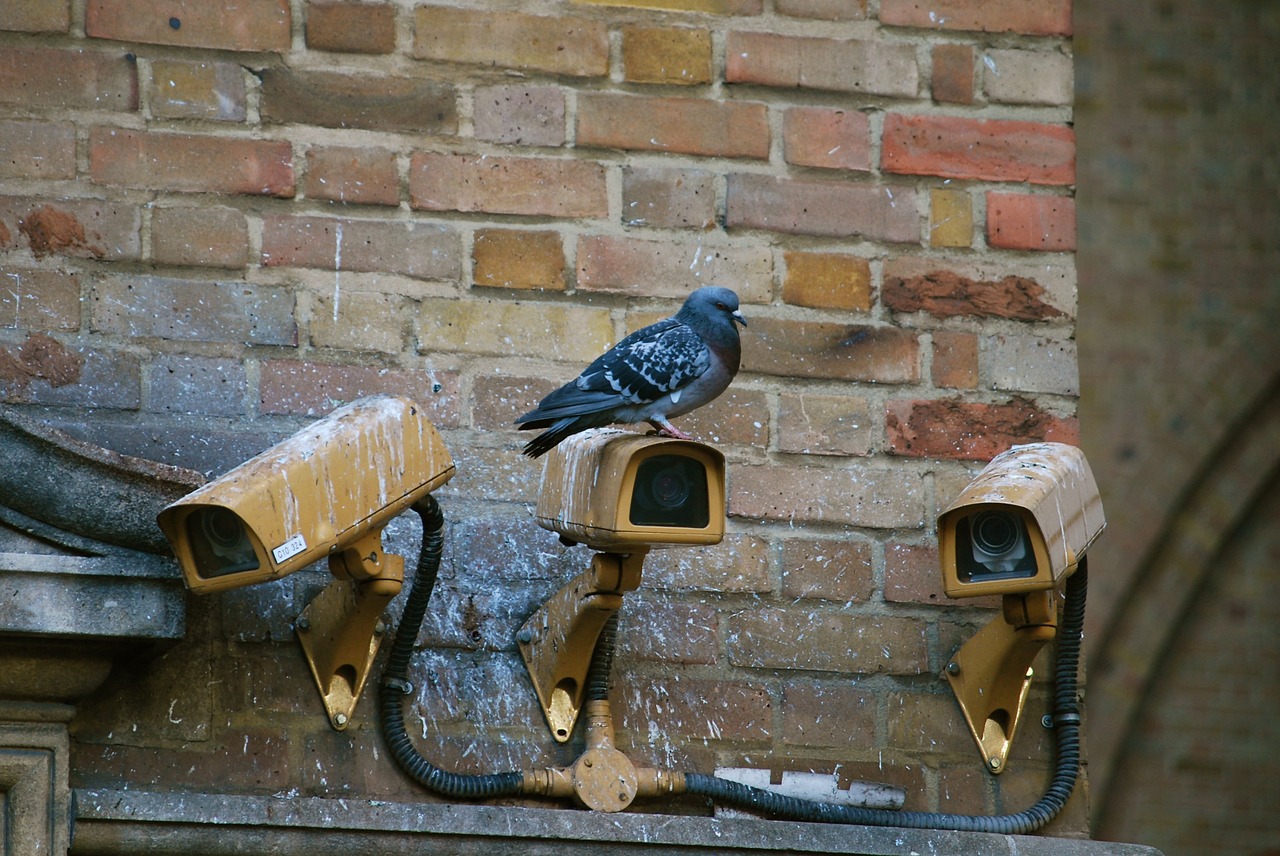Last updated on December 1, 2021
“It was terribly dangerous to let your thoughts wander when you were in any public place or within range of a telescreen. The smallest thing could give you away. A nervous tic, an unconscious look of anxiety, a habit of muttering to yourself–anything that carried with it the suggestion of abnormality, of having something to hide. In any case, to wear an improper expression on your face…; was itself a punishable offense.”
George Orwell’s 1984 was published in 1949, a time when no one would be able to fathom a reality as far-fetched as portrayed in his novel. However, fast forward only 50 years later and elements of 1984 are already commonplace in the United Kingdom.
UK’s estimated 4.2 million closed-circuit television (CCTV) cameras are not only limited to surveillance – just as predicted in Orwell’s novel, they are able to employ sophisticated algorithms to predict crime before it happens and use loudspeakers to communicate with those in their proximity.
But UK’s CCTV cameras are not only preventing crime, they’re also instructing people to pick up their garbage, walk their bikes in pedestrian zones, and catch youths unaccompanied by adults after a mandatory 9PM curfew. The average UK citizen is recorded on camera over 300 times a day!
Competing Interests
The debate regarding the use of government surveillance is well balanced: the government requires tools and techniques to prevent and monitor crime and ordinary citizens want a sense of privacy in a public place.
However, with limited guidelines in place, it is easy to see how the government can use its enormous size and power to put its own interests in front of ordinary citizens’ right to privacy. Some would argue that individuals do not, in fact, have a right to privacy in a public place anyways.
So who draws the line when competing interests clash? Both sides have valid perspectives, concerns and objectives, but it is unfortunately the one who exerts power over the masses who wins.
Surveillance: An Ordinary Life Affair
Like George Orwell’s 1984, the majority of citizens became used to the heavy government surveillance, insomuch that it seemed like an ordinary life affair.
Now that citizens are being watched, spoken to, and analyzed by CCTV cameras, the “shock value” is fading away. This leaves sufficient wiggle room for newer, more pervasive surveillance technologies to enter.
For example, at the City of Ely Community College in Cambridgeshire, students now sign in to school using a system that uses face recognition technology.
This raises obvious privacy issues:
- What organization is collecting images of students’ faces?
- Where are the images stored?
- Who has access?
- Are they being transferred to third parties?
- What are the safeguards used to protect these images?
- How long are they stored before deletion?
These are all relevant questions that privacy activists and concerned parents alike should be asking.
One of the pitfalls of UK’s heavy surveillance is that its citizens will no longer pose these types of questions to protect their privacy. A school’s database of personal information linked with these images could cause gargantuan privacy issues if it were leaked to the public.
Privacy and Government Legislation
Privacy is a fundamental human and civil right. An individual’s right to privacy is deeply rooted in history, even being mentioned in the Qur’an, Bible, and recognized in classical Greece and ancient China.
Article 8 of the European Convention for the Protection of Human Rights and Fundamental Freedoms 1950 (ECHR), legislation relevant to the United Kingdom, states that:
- Everyone has the right to respect for his private and family life, his home and his correspondence;
- There shall be no interference by a public authority with the exercise of this right except as in accordance with the law and is necessary in a democratic society in the interests of national security, public safety or the economic well-being of the country, for the prevention of disorder or crime, for the protection of health of morals, or for the protection of the rights and freedoms of others
Because UK’s CCTV cameras are for the “prevention of disorder or crime,” this piece of legislation gives the Government leverage to support its endeavours.
UK’s Regulation of Investigatory Powers Act (RIPA, 2000) also gives public bodies power to perform surveillance and investigate by intercepting communications and for the purposes of preventing or detecting crime and public disorder. This leaves the average UK citizen with very little to say or do about the government’s use of surveillance.
Information Access Requests
One benefit that individuals have under UK legislation is the right to make information access requests. They can do this under both UK’s Data Protection Act and Freedom of Information Act, depending on whether the organization operates in the private or public sector.
Under section 7 of the Data Protection Act (Right of access to personal data), UK citizens are able to request access to view CCTV images of themselves from certain private bodies, and many organizations offer citizens the ability to request this information online.
Information access requests have become so popular in the UK that mySociety.org, a non-profit provider of popular democracy and transparency websites in the UK, hosts a popular website where UK citizens are encouraged to contact government authorities using information access requests and post the information online for all to see.
Some citizens have found clever uses for these requests. The Get Out Clause, an unsigned band from Manchester, UK was unable to afford a proper music video so they set their instruments up in over 80 locations across town while playing their hit song. They used information access requests to request CCTV footage of their band playing and were able to construct the pieces together to create a truly unique music video.
An Issue of Trust
The government wants to put a simple message across its nation: why worry if you have nothing to hide?
For the average law-abiding citizen, being recorded nearly 300 times a day should pose no threat. However, an individual’s privacy should not be taken away simply because of that notion.
Employees generally work more efficiently when they know their employers trust them – it creates a strong relationship of trust between the employee and employer. This should be no different from the citizen-government relationship.
Citizens should have the right to feel like their daily life is not recorded and watched by government employees behind cameras. It may help prevent crime and catch the minority of crooks, but it is at the expense of losing the trust of the vast majority of the population in that nation’s government.
CCTV Alternatives
Before looking into video surveillance, a government should look at other less-costly alternatives.
Some UK cities have found, for example, that effective lighting is a good way to combat crime.
Good lighting not only helps combat crime, it also helps reduce the fear of crime. When good lighting is present, it causes people to more freely inhabit areas that would otherwise be vacant.
Another option is to increase the amount of community-based groups in problematic areas in the short-run and put money into the educational system for results in the long-run.
In Baltimore, Maryland, a community where “more young men go to prison than to college,” programs like the Reaching the Unreachable Outreach Ministry have found great success helping dropouts get high-school diplomas, young people find jobs, and others learn useful life skills so that they avoid the drug and gang culture found on the streets.
Investing in education is one of the most important things a nation can do to improve the overall quality of life of its people. A publication written by Bard College also shows an “overwhelming consensus among public officials that post-secondary education is the most successful and cost-effective method of preventing crime.”
CCTV Suggestions
Video surveillance should only be used as a last resort, and the decision to install cameras should be open for public discussion. The government should show what alternative methods it has used or considered, and be able to explain the benefit of video surveillance over alternative methods.
After determining a strong purpose for installing CCTV cameras, the government should develop policies and guidelines to ensure that video surveillance is done properly and is not excessive or invasive.
For starters, these policies should explain where cameras will be installed, how many will be installed, how often they will be operated (peak times or all time), and whether or not some or all will have recording capabilities.
Policies and procedures must also explain what type of employees will be able to run the cameras and what type of penalties they will receive if they defy these policies. Because of the sensitive nature of the job, all of these employees should be extensively screened and undergo mandatory privacy and security training.
The government should consult with other government agencies and third parties, such as various privacy organizations or privacy commissioners in other nations in order to create a system that strikes an effective balance between an individual’s right to privacy and the government’s need to prevent crime.
Next, a government should be open about its implementation and use of video surveillance. It should do this by having procedures where employees and the department are regularly audited and have the results of this audit either available to the public or to an unbiased, trusted third-party auditing agency which can do something if the government is found to be going astray in its efforts.
The government should also undergo a test-run with a small amount of cameras in problematic areas for 6-12 months and allow the results of an unbiased performance review to be available to the public. If the cameras have been deemed to be substantially effective against preventing and combating crime, the government should be allowed to moderately expand.
Since the government was created to serve the public, it should take the public’s interests into account.
Conclusion
Although the United Kingdom seems not too far from a complete reality of George Orwell’s 1984, there are still many other nations, such as the U.S. and Canada, that are always exploring alternatives to preventing and combating crime.
Citizens in these nations must be careful that their governments do not seek intrusive surveillance methods before considering other effective alternatives such as lighting, community programs, and investing in education.
And although UK citizens are already used to the barrage of government surveillance, they should still stand on guard and resist apathy to ensure that the little amount of privacy they still have left is not lost to newer, more intrusive methods of government surveillance.




Well explained and beautiful written. I like the way you explained it.
I understand that there’s a UK family that’s being secretly filmed at home and broadcast openly to the public and no one objects to this.